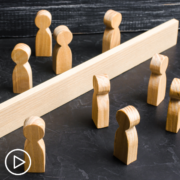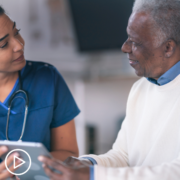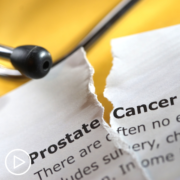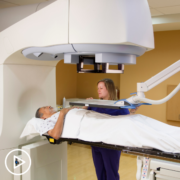What Impact Does Advanced Prostate Cancer Have on Lifestyle?
What Impact Does Advanced Prostate Cancer Have on Lifestyle? from Patient Empowerment Network on Vimeo.
What should advanced prostate cancer patients expect for treatment impact? Expert Dr. Yaw Nyame with the University of Washington explains common treatment side effects, advice for easing physical side effects, and ways for patients and care partners to find support.
See More from [ACT]IVATED Prostate Cancer
Related Resources:

|

|

Advanced Prostate Cancer Diagnosis and Survival | Black and Latinx Disparities |
Transcript:
Lisa Hatfield:
There is often a tendency to associate advanced prostate cancer with a risk to relationship intimacy. And can you speak to sexual dysfunction and other lifestyle concerns when it comes to prostate cancer and that diagnosis?
Dr. Yaw Nyame:
So, prostate cancer, it’s important to remember that the prostate itself is a sex organ for men, right? Its primary purpose is to produce seminal fluid, the fluid that comes out with ejaculation. And it’s closely linked to a whole lot of structures in your pelvis that support, you know, erectile function and sexual function. All of our treatments have the very real potential to impact sexuality and sexual function. And, I think part of what’s important to do is you go into these and to your conversation with your doctors is to understand how your sexual function, your urinary function, and sometimes your bowel function are going to be impacted by these treatments.
And to get some real clarity about what life will look like for you post-treatment and the setting of advanced cancer, there’s also the added potential of impact to sexual function from the hormone suppression. When we take away your testosterone, oftentimes we take away things like libido or your sexual desire, and we can impact erectile function as well.
You know, things that can help overcome some of the side effects of that hormone suppression are definitely diet and exercise, being active, keeping your muscle mass up, having good dietary habits seem to help. We have a lot of mixed reviews and the literature about the benefit, but I, yeah, I’m a strong believer that the healthier you can be as you undergo these treatments, the better you’re going to do overall. My activation tip when it comes to these new diagnoses is to really invest in advocacy organizations that exist in your community so that you can be connected to other men who are undergoing treatment to have candid conversations about life as a prostate cancer survivor. Organizations like ZERO – the End of Prostate Cancer. There are local groups the NASPCC, there are just chapters and groups of men all across the country that gather to talk about their journey.
And I think that that can be a really wonderful network to better understand what treatment realities may look like for you, but also to support the emotional and physical toll that treatment may take on you. And I think that, that being part of those networks actually will also arm you and empower you to have really good conversations with your doctors to understand what resources are available to support you in your survivorship.
What a lot of men and individuals of prostate cancer aren’t told is that there are some solutions for some of these problems may not be like it was before, but there are many treatments that can exist and do exist that can help preserve certain portions of this quality of life, these quality of life components. And if you don’t know about them, you can’t ask about them. And if you’re not willing to confront them, you may not ask about them and suffer unnecessarily.
My activation tip for care partners related to this question would be, have the tough conversation. Talk about having the tough conversation, schedule a time to try and do it. Don’t do the tough conversation when the football game is on, on Sunday evening. Don’t have it on Wednesday night when the baseball playoffs are going on, but have that conversation so that the care partner can help advocate for the patient about those things that the patient may feel uncomfortable talking about. But if we don’t talk about it, we can’t work on it. And if we don’t work on it, we can’t fix it. So it is important to have the tough conversation.
Lisa Hatfield:
Right, thank you both Dr. Nyame and Sherea, who is a care partner. Thank you for that. Those activation tips.









